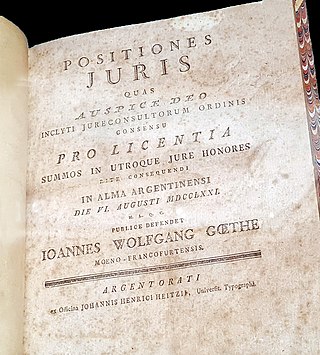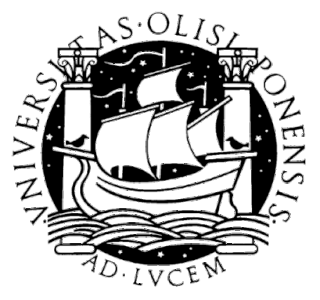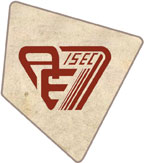
A Master of Science is a master's degree. In contrast to the Master of Arts degree, the Master of Science degree is typically granted for studies in sciences, engineering and medicine and is usually for programs that are more focused on scientific and mathematical subjects; however, different universities have different conventions and may also offer the degree for fields typically considered within the humanities and social sciences. While it ultimately depends upon the specific program, earning a Master of Science degree typically includes writing a thesis.

The University of Trás-os-Montes and Alto Douro is a public university located in the north-eastern city of Vila Real, Portugal.

The Bologna Process is a series of ministerial meetings and agreements between European countries to ensure comparability in the standards and quality of higher-education qualifications. The process has created the European Higher Education Area under the Lisbon Recognition Convention. It is named after the University of Bologna, where the Bologna declaration was signed by education ministers from 29 European countries in 1999. The process was opened to other countries in the European Cultural Convention of the Council of Europe, and government meetings have been held in Prague (2001), Berlin (2003), Bergen (2005), London (2007), Leuven (2009), Budapest-Vienna (2010), Bucharest (2012), Yerevan (2015), Paris (2018), and Rome (2020).

A licentiate is an academic degree present in many countries, representing different educational levels. It may be similar to a master's degree when issued by pontifical universities and other universities in Europe, Latin America, and Syria.
An institute of technology is an institution of tertiary education that specializes in engineering, technology, applied science, and natural sciences.

Polytechnic of Porto - School of Engineering (ISEP) is a public polytechnic higher learning and research engineering institute, located in the city of Porto, Portugal. ISEP is divided in 8 departments, with an emphasis on applied science and technology.

Education in Portugal is free and compulsory until the age of 18, when students usually complete their year 12. However, only one of those requirements is necessary. The education is regulated by the State through the Ministry of Education. There is a system of public education and also many private schools at all levels of education. The first Portuguese medieval universities, such as the University of Coimbra, were created in the 13th century, and the national higher education system is fully integrated into the European Higher Education Area.
The Polytechnical Institute of Lisbon(Instituto Politécnico de Lisboa) is one of the biggest state-run polytechnic institutes in Portugal. It was founded in Lisbon in 1985, being composed by several higher education institutes and schools, some of them with a longer history. In total, 12,933 students were enrolled on all schools for the 2007-2008 school-year.
The Polytechnical Institute of Coimbra is a public polytechnic institute of higher education in Coimbra, Portugal. It was created by decree of 1979, but its effective start up was only in 1988 through the creation and union of new and former schools. With an enrollment of 10,197 (2008) students, it is the third biggest polytechnic institute of Portugal.
Instituto Industrial e Comercial de Lisboa was a former Portuguese school of vocational education founded in 1852 as Instituto Industrial de Lisboa, by Minister Fontes Pereira de Melo decree of 30 December. Its aim was the creation of a technical school of vocational education, whose purpose was to facilitate the ongoing industrialization process set up by Pereira de Melo. The education of a large number of skilled industrial technicians in several areas, was one among many innovative reforms Pereira de Melo idealized as Minister. This qualified workers were suited to deal with the new needs in industry.

The Ordem dos Engenheiros is the regulatory and licensing body for the engineering profession in Portugal. It is headquartered in Lisbon, and has several regional branches in other Portuguese cities.

Engineering education is the activity of teaching knowledge and principles to the professional practice of engineering. It includes an initial education, and any advanced education and specializations that follow. Engineering education is typically accompanied by additional postgraduate examinations and supervised training as the requirements for a professional engineering license. The length of education, and training to qualify as a basic professional engineer, is typically five years, with 15–20 years for an engineer who takes responsibility for major projects.
Higher education in Portugal is divided into two main subsystems: university and polytechnic education. It is provided in autonomous public and private universities, university institutes, polytechnic institutes and higher education institutions of other types.

Science and technology in Portugal is mainly conducted within a network of research and development (R&D) units belonging to public universities and state-managed autonomous research institutions. There are also non-state-run research institutions and some private R&D projects developed by companies.
The University of São Tomé and Príncipe, USTP, is a public institution of higher education in São Tomé and Príncipe. It is the main institution dedicated to teaching, research and university extension of the country. It was established in 2014 by merging three older institutions of higher education: ISP, EFOPE and ICS.
The Escola Superior Agrária de Coimbra (ESAC), in English the Agrarian School of Coimbra, is a state-run polytechnic higher education school of agriculture, based in Coimbra, Portugal. The oldest of the Coimbra Polytechnical Institute's (IPC) autonomous institutions, it has also IPC's largest campus.
Polytechnic is one of the two sub-systems of higher education of Portugal, the other being a university education. The polytechnic higher education focuses on providing more practical trainings and profession-oriented, while university education has a strong theoretical basis and highly research-oriented. Polytechnic institutions only grant licentiate's and master's degrees, as opposed to universities granting doctor's degrees.
Nuno Miguel Fonseca Ferreira is the current president of ISEC "Coimbra Institute of Engineering". Nuno Ferreira formally took office April 13, 2010, succeeding Jorge Bernardino. Ferreira's official inauguration celebrations took place at the principal auditorium at 16:30. He was received with high expectations being a former alumni of ISEC.

The Polytechnic School of Federal University of Rio de Janeiro, also called "Poli", founded in 1792, is the third oldest engineering school in the world and oldest in the Americas, with the Military Institute of Engineering being one of the first institutions of higher education in Brazil. It is considered one of the best institutions of Latin America in engineering education. It is located in the UFRJ Center of Technology (CT), in the Cidade Universitária, Rio de Janeiro.

The University of Lisbon was a public university in Lisbon, Portugal. It was founded in 1911 after the fall of the Portuguese monarchy and was later integrated in the new University of Lisbon along with the former Technical University of Lisbon.












